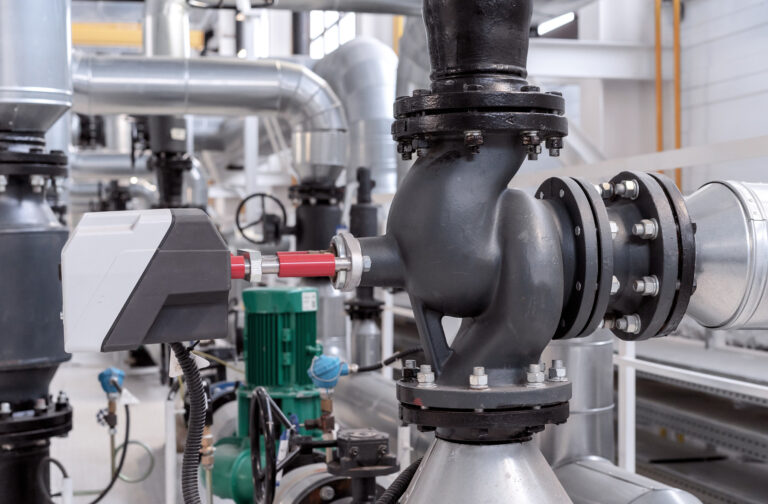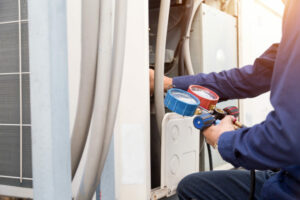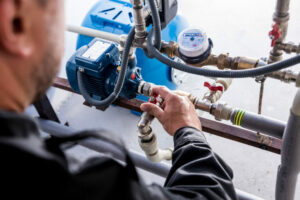May 11, 2023
It’s time for a Summer PM for commercial, industrial, and organizational cooling systems that are used for either comfort (temperature) or process (functionality). Here are three main reasons you should have a regular pre-season schedule of PMs for your business cooling and HVAC system:
1. PMs can extend the life of your equipment. Preventive maintenance on your HVAC system will not only ensure that the equipment is operating at maximum efficiency, but it will also extend the life of that equipment.
2. PMs can save you a great deal of money. A PM can save your company money by preventing costly breakdowns, reducing energy bills, extending the life of your system, and keep your system protected under warranty.
3. PMs can save you a great deal of time. If there is an issue or repair needed that involves a new part, the sooner you discover this the better. The HVAC supply chain, like all other supply chains, are still struggling due to the post-pandemic world, with labor shortages, shortages of raw materials, and backorders of semiconductor chips, factories aren’t producing as much as they used to, so longer wait time on part orders are part of our new normal.
4. Automated PMs can alleviate stress. Having a regular scheduled bi-annual Preventative Maintenance plan with Comfort and Process Solutions will automate the scheduling process, so you don’t have to set reminders or worry needlessly when the next PM is going to be. Our office team will notify you when we can schedule the next PM, according to your business’ needs.
This is a great time of year to get started to plan for a smooth, comfortable and issue free summer season for your business or organization. Summer temperatures are already upon us and usually extend to late September, sometimes longer. That means commercial and industrial cooling system usage are extended. Likewise, Chillers and Cooling Towers are running continually for months for those using their systems for the comfort for their staff, customers, students, and patients; and cooling systems used for process (whether for manufacturing or industrial plants) are in use all year round.
So the three parts of our PM sessions include: PLAN, PREPARE and PERFORM.
1. THE PLANNING
Our team along with our clients, we will work out a Schedule for Routine Maintenance. This could be done on a Daily, Weekly, Monthly, Quarterly and Annually, according to the needs of the client and the usage of their cooling systems.
Communication is key in our partnership with our clients, so once a schedule has been determined, we sit down and explain the reasons for our recommendations, the checklist of items we will be inspecting on each visit and let the company or organization’s Administrator, Director, and other team members aware of it, in writing and in person.
Our team will keep a detailed log of our findings including repairs, modifications, parts cleaned and inspected, and the current efficiency standards of their equipment, with suggestions on how to improve energy efficiency and costs.
As safety is our number one priority, we will also include notes of Hazardous and Safety issues, including any recalls, manufacturer recommendations, and signs to look for to avoid downtime or malfunction that could result in injury.
Your client file will include a complete record of all Equipment including make and model, year issued, manufacturer guidelines and manuals, as well as a complete list of tools machinery and parts that could or will need replacement in the future.
Daily Schedule of PM
• On the day of our Preventative Maintenance, that has been previously scheduled, we will walk the facility, with our team alone or with the facility manager or director, which is up to each client’s schedule and availability.
• During our walk-through, we will examine all equipment on a visual basis to look for leaks of water, chemicals, or oil.
• We will also record current temperature and pressure readings to ensure the equipment is functioning, energy-efficient and safe.
• We will also listen for any unusual noises, hissing, clanking, or sputtering sounds could indicate loose or broken parts.
• We will also be alert to any unusual smells that could indicate an unseen leak of chemicals or oils. emilyWe use all five senses, and our years of experience, our training and certification for a thorough examination of your cooling and chilling equipment.
Together, at least two members of our team will document what equipment is running properly and what equipment needs further examination and testing.
Weekly Schedule of PM
• After the initial examination, we will begin to further examine and determine causes of any found leaks, unusual sounds and provide checks on manufacturer-recommended equipment inspections.
• We will thoroughly check and test the water treatment. We will talk to the company’s team members about any discovered unusual noises, smells, or temperature and pressure readings.
• We will check all doors and locks to ensure the safety of all industrial equipment used. Our weekly checks will include inspection of all lead and lag pumps, blowdown boilers, pumps and ensure all equipment is switching according to temperature needs.
• After each phase of our inspection and PM, our team will document all our findings, so the client has all the information they need to make a well-informed decision when it comes to repair and replacement of their equipment.
Monthly Schedule of PM
• Our team will check and/or change all filters.
• To save you money on your utility and energy bills, we will compart your utility bills with the months before, up to one year to look for any discrepancies. A large increase of energy usage almost always indicates an issue that can be managed and resolved.
• Our team will conduct a thorough cleaning of your company’s mechanical room, as a clean space will assist in managing dirt and grime building on your equipment’s parts, and it will be easier to discover leaks that need repairs. We will check all oil and coolant levels, supplementing the levels as needed.
Quarterly Schedule of PM
We recommend a seasonal frequency which will include a Spring, Summer, Fall and Winter PM check. This will give your team plenty of time to perform the tasks recommended and alert us to any issues or concerns before they become a major repair or replacement. At the very minimum, your team should be inspecting each piece of equipment at least quarterly or twice per year. This is the most important appointment you need to keep for your company’s output and profitability.
Annual Schedule of PM
At the annual PM, we will work with your managers and team to build a plan and budget for the upcoming year, along with scheduling and/or modifying your schedule frequency for change outs and PMs. Together, we will compare all logs and documentation from the previous year, and again do a full-year comparison of the monthly utility bills. This is the time we will also make recommendations for upgrades and equipment replacements, considering the repairs that were needed and manufacturer’s suggested lifespans. We will conduct an examination of your equipment, make needed adjustments, clean or change belts, fans, motors and/or bearings.
2. THE PREPARATION
• We will develop and distribute a checklist for your facility managers and team members so are well informed on which items to check for and document which tasks have been completed, for our records and yours.
• Beforehand, we will inspect your job site to ensure that all safety equipment, PPE, tools, and correct personnel is on hand. We will train your employees to know the equipment they are working on and we will research and gather manuals if they are missing. We will double-check to make sure all the proper materials are there and ready to be used, if needed.
• Before we begin, we will review all logs determining if there are any changes and/or modifications needed to be made, we will review notes of any previous problems to prevent recurrence and discuss with the team members any issues or concerns they may have. If needed, we will give advance notice of an equipment shutdown to all facility managers and team members. And before shutdown, ensure a qualified, trained and manufacturer-certified technician is on hand and working on that piece of equipment.
• If the company is using a contractor, we will update him/her on any new issues, pre-determined protocols, and discuss in detail any safety issues and precautions.
3. THE PERFORMANCE
Because these units typically run continuously through the season, and sometimes throughout the year, we recommended regularly checking the systems efficiency, the wear and tear of all the moving parts as well as the levels of water, refrigerant and air flow.
1. First we will do a walk around all equipment, checking for current conditions, temperatures, and any potential hazards.
2. Then we will examine Indoor Air Quality (IAQ) equipment, changing any filters, bulbs, batteries needed, and checking the IAQ is fully operational.
3. Periodically, we will do a full check on pool heaters, filters, gas pressure, combustion, and burners blow down. If necessary, we will descale, clean, or replace.
4. We will do a boiler inspection which includes gas pressure, combustion, gas leaks, flue pipe, combustion heat exchangers. We will remove dirt, grease components, and add lubrication, as needed. We will open and close the equipment for further examination.
5. We will complete an Air Handler inspection by cleaning and greasing (using manufacturer recommended lubrication), check vibrations, volt, and amps. We will check and clean the coils to remove all residue, dirt, and debris; and clean drainage of all clogs to prevent water damage.
6. We will inspect exhaust fans, housing, bearings, and motor to make sure all fans are operational, clean, without cracks or damage. The fans will be greased quarterly, as well as conduct a check of vibrations, volts, and amps. The belts should be changed annually.
7. We will inspect chillers by checking pressure, cleaning coils and safety valves, as well as checking volts and amps.
8. Water heaters will be checked, cleaned, and descaled, if necessary. The volts and amps on each piece of equipment will be gaged and checked for proper levels. We will also check the gas lines and equipment for pressure, leaks and/or combustion.
9. All electrical components on all equipment should be periodically tightened, inspected for burn marks, and again volts and amps gaged.
10. A full combustion analytics should be completed at least once per year on all gas-powered equipment. The analytics data should be recorded and documented for federal, state and insurance safety guidelines.
11. All dehumidifiers should be checked twice per year, coils cleaned, pressure, temperature and oil levels checked, as well as sensors calibrated.
12. All compressors should similarly be checked. If an issue on the compressor is suspected, run analytics on the oil levels. Check Ohms (resistance) and if an issue is found, determine the cause.
13. For Air Compressors, we will change the oil, filters, and belts according to the manufacturer’s recommendations, as well as check for leaks.
14. Check for any voltage imbalance and amperage to prevent overheating and premature motor failure, as well as keep energy costs low.
15. We will clean all burners with water or pressured air cleaner, depending on the type of equipment. We will also check for any damage or build up of dirt or grime.
16. We will apply recommended lubricants to all dampers, at least annually.
4. EXPERIENCED & TRAINED TECHNICIANS
With our thorough PMs, comes a team of technicians that are all experienced, certified, and factory trained. On-going factory training is required of all our technicians. Our skilled team of equipment and controls technicians are on-call 24 hours a day, 7 days a week for all your HVAC needs.
Call today to get your Seasonal PM scheduled.


